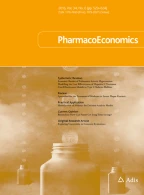Abstract
Background
A large number of economic evaluations have been published that assess alternative possible human papillomavirus (HPV) vaccination strategies. Understanding differences in the modelling methodologies used in these studies is important to assess the accuracy, comparability and generalisability of their results.
Objectives
The aim of this review was to identify published economic models of HPV vaccination programmes and understand how characteristics of these studies vary by geographical area, date of publication and the policy question being addressed.
Methods
We performed literature searches in MEDLINE, Embase, Econlit, The Health Economic Evaluations Database (HEED) and The National Health Service Economic Evaluation Database (NHS EED). From the 1189 unique studies retrieved, 65 studies were included for data extraction based on a priori eligibility criteria. Two authors independently reviewed these articles to determine eligibility for the final review. Data were extracted from the selected studies, focussing on six key structural or methodological themes covering different aspects of the model(s) used that may influence cost-effectiveness results.
Results
More recently published studies tend to model a larger number of HPV strains, and include a larger number of HPV-associated diseases. Studies published in Europe and North America also tend to include a larger number of diseases and are more likely to incorporate the impact of herd immunity and to use more realistic assumptions around vaccine efficacy and coverage. Studies based on previous models often do not include sufficiently robust justifications as to the applicability of the adapted model to the new context.
Conclusions
The considerable between-study heterogeneity in economic evaluations of HPV vaccination programmes makes comparisons between studies difficult, as observed differences in cost effectiveness may be driven by differences in methodology as well as by variations in funding and delivery models and estimates of model parameters. Studies should consistently report not only all simplifying assumptions made but also the estimated impact of these assumptions on the cost-effectiveness results.
Similar content being viewed by others
References
Syrjänen K, Syrjänen S. Epidemiology of human papilloma virus infections and genital neoplasia. Scand J Infect Dis. 1990;69:7–17.
Bosch FX, Lorincz A, Munoz N, Meijer CJ, Shah KV. The causal relation between human papillomavirus and cervical cancer. J Clin Pathol. 2002;55:244–65.
Forman D, de Martel C, Lacey CJ, Soerjomataram I, Lortet-Tieulent J, Bruni L, et al. Global burden of human papillomavirus and related diseases. Vaccine. 2012;30(Suppl 5):F12–23.
Bosch FX, de Sanjose S. Chapter 1: Human papillomavirus and cervical cancer—burden and assessment of causality. J Natl Cancer Inst Monogr 2003;31:3–13.
Dillner L, Kjaer SK, Wheeler CM, Sigurdsson K, Iversen OE, Hernandez-Avila M, et al. Four year efficacy of prophylactic human papillomavirus quadrivalent vaccine against low grade cervical, vulvar and vaginal intraepithelial neoplasia and anogenital warts: randomised controlled trial. BMJ. 2010;341:c3493.
US Food and Drug Administration. FDA approves Gardasil 9 for prevention of certain cancers caused by five additional types of HPV [press release]. 2014. http://www.fda.gov/NewsEvents/Newsroom/PressAnnouncements/ucm426485.htm.
De Vincenzo R, Ricci C, Conte C, Scambia G. HPV vaccine cross-protection: highlights on additional clinical benefit. Gynecol Oncol. 2013;130(3):642–51.
Bonanni P, Levi M, Latham NB, Bechini A, Tiscione E, Lai P. An overview on the implementation of HPV vaccination in Europe. Hum Vaccin. 2011;7:S128–35.
Sinisgalli E, Belline I, Indiani L, Sala A, Bechini A, Bonanni P, Boccalini S. HPV vaccination for boys? A systematic review of economic studies. Epidemiol Prev. 2015;39(4):51–8.
Bogaards JA, Coupé VM, Meijer CJ, Berkhof J. The clinical benefit and cost-effectiveness of human papillomavirus vaccination for adult women in the Netherlands. Vaccine. 2011;29(48):8928–36.
Kim JJ. Targeted human papillomavirus vaccination of men who have sex with men in the USA: a cost-effectiveness modelling analysis. Lancet Infect Dis. 2010;10(12):845–52.
Romanowski B. Long term protection against cervical infection with the human papillomavirus: review of currently available vaccines. Hum Vaccin 2011;7(2):161–9.
Giraldi G, Martinoli L, De Luca d’Alessandro E. The human papillomavirus vaccination: a review of the cost-effectiveness studies. Clin Ter. 2014;165(6):e426–32.
Fonseca AJ, de Lima Ferreira LC. Systematic review of the cost-effectiveness of the vaccination against HPV in Brazil. Hum Vaccin Immunother. 2014;10(12):3484–90.
Setiawan D, Luttjeboer J, Westra TA, Wilschut JC, Suwantika AA, Daemen T, Atthobari J, Wilffert B, Postma MJ. The cost-effectiveness of HPV vaccination in addition to screening: a Dutch perspective. Expert Rev Vaccin. 2015;14(4):589–604.
Jiang Y, Gauthier A, Postma MJ, Ribassin-Majed L, Largeron N, Bresse X. A critical review of cost-effectiveness analyses of vaccinating males against human papillomavirus. Hum Vaccin Immunother. 2013;9(11):2285–95.
Marsh K, Chapman R, Baggaley RF, Largeron N, Bresse X. Mind the gaps: what’s missing from current economic evaluations of universal HPV vaccination? Vaccine. 2014;32(30):3732–9.
Drummond M, Barbieri M, Cook J, Glick HA, Lis J, Malik F, et al. Transferability of economic evaluations across jurisdictions: ISPOR good research practices task force report. Value Health. 2009;12(4):409–18.
Eddy DM, Hollingworth W, Caro JJ, Tsevat J, McDonald KM, Wong JB. ISPOR−SMDM Modeling Good Research Practices Task Force. Model transparency and validation: a report of the ISPOR-SMDM Modeling Good Research Practices Task Force–7. Value Health. 2012;15(6):843–50.
Elbasha EH, Dasbach EJ, Insigna RP. Model for assessing human papillomavirus vaccination strategies. Emerg Infect Dis. 2007;13(1):28–41.
Goldie SJ, Kim JJ, Kobus K, Goldhaber-Fiebert JD, Salomon J, O’Shea MK, Xavier Bosch F, de Sanjosé S, Franco EL. Cost-effectiveness of HPV 16, 18 vaccination in Brazil. Vaccine. 2007;25(33):6257–70.
Author information
Authors and Affiliations
Corresponding author
Ethics declarations
Funding
This research was supported by funding from a UK Department of Health Policy Research Programme (027/0089).
Conflict of interest
All authors (Joshua Pink, Ben Parker and Stavros Petrou) declare they have no conflicts of interest.
Author Contributions
All authors contributed to the study design and conduct, interpretation of results and report writing. JP acts as the guarantor.
Electronic supplementary material
Below is the link to the electronic supplementary material.
Rights and permissions
About this article
Cite this article
Pink, J., Parker, B. & Petrou, S. Cost Effectiveness of HPV Vaccination: A Systematic Review of Modelling Approaches. PharmacoEconomics 34, 847–861 (2016). https://doi.org/10.1007/s40273-016-0407-y
Published:
Issue Date:
DOI: https://doi.org/10.1007/s40273-016-0407-y
